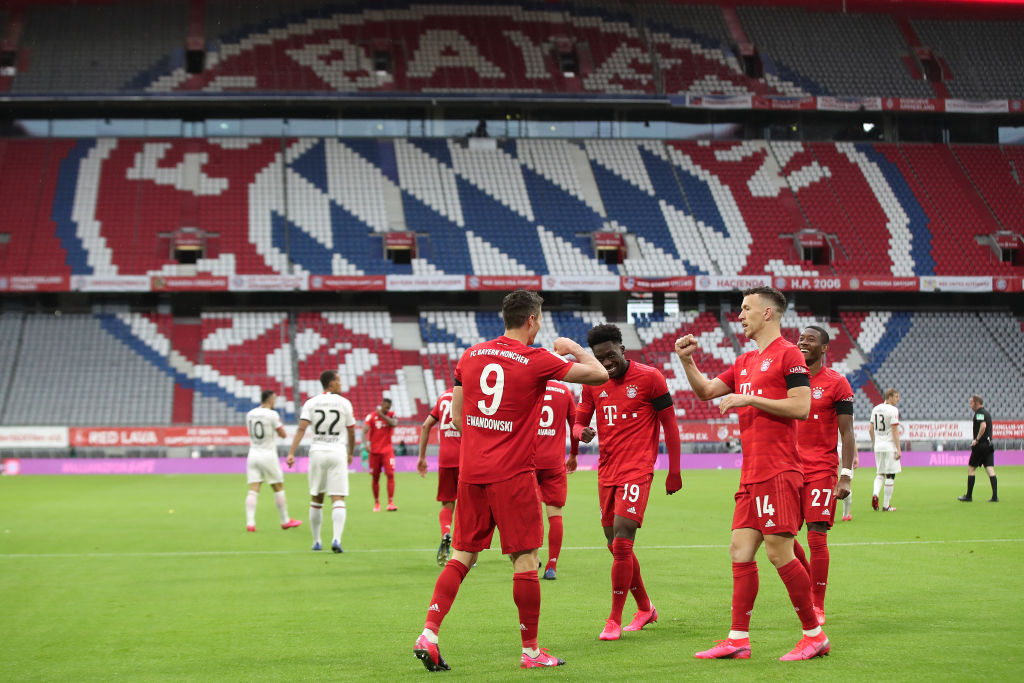Football without fans has placed a spotlight on the mistakes and placed the elite on a podium
In a future not so far from now, people will remember the days they spent in lockdown. The days they spent shut in their own houses, thanks to a virus that the leader of the free world believed came from eating a bat. But more importantly, they’ll remember how football strolled back into our lives.

On the eve of the return of the second major European league from lockdown, people will remember how German football fought against its very nature to force a return. That is what they are known for after all, football stadiums jam packed with fans, standing and cheering for their favourite clubs. In the near past, if one took the time to Google the Bundesliga, or even German football for that matter, the search result would be pages of stadiums chock full of fans. You would’ve seen Signal Iduna Park, Bayern’s Allianz Arena and a myriad more, all full of fans but things have changed now and that applies to everything.
The return of football without fans has essentially ruined an opening paragraph or rather a key element to any feature written about the Bundesliga because they make up so much of not just what football means but the sheer atmosphere of a stadium. But in this day and age, you’ve got to make do with what you’ve got and the world has missed football, as Jurgen Klopp put it rather brilliantly. In an interview with Dan Walker, Klopp said “we fall in love with football as a game first, and then as a spectacle. I miss the spectacle. The spectacle is what makes your hair stand on end. But deep down, quite a lot of us love the game itself, too.”
The spectacle is what the fans add to but the game, the game is what many have missed over the years thanks to the distraction that the fans provide us with and it’s a welcome one. But over the last month or so, since the Bundesliga’s made its triumphant return, their world has looked a tad bit different. Football games have lacked that emotion and atmosphere with many forced to inject fake atmosphere into stadiums but the football on display has been affected by the lack of a pulse in a stadium. Teams seem to lack that drive and against the elite or good sides, that makes a lot of difference especially when you don't have fans to help make up their faults.
As Arsene Wenger put it, in an interview with the Athletic, "In Germany, for example, you can see that in home games against bigger opponents, there is an element missing — that tension, that belief, that motivation that is coming from outside the pitch. You see that the internal motivation of the club is not big enough against the big clubs. The bigger teams have more quality, so a way to reduce the difference between the teams is, of course, to have the support of your fans and get that intensity into the game." But without that rousing atmosphere in the background, few across the world ever noticed the football on show but that has changed and with the change comes another one.
It was first noticed before the shutdown when Juventus faced Inter Milan all those months ago before the lockdown. But people brushed it off although now the Bundesliga has made it unequivocally clear. Somehow the stillness, the lack of a welcome distraction in our periphery has made things clearer to see. Not better – it’s not even close – but clearer because it has opened the wondrous game of football to our eyes and almost automatically something becomes blatantly clear. The elite, the Bayern Munich’s, the RB Leipzig’s, the Borussia Dortmund’s and even the Bayer Leverkusen’s of football are all in much better shape than anyone expected.
The last month has proved that brilliantly, whether it be Dortmund thrashing Schalke in Revierderby, Leipzig putting 5 past Mainz, Bayern beating Eintracht Frankfurt 5-2 or even watching Kai Havertz tear teams apart. Somehow, their better financial standing among the others have afforded them a luxury the other smaller sides haven’t been able to get their hands on. Whether it be better training facilities, better coaches or even a better/faster method to recover from games and those who say that doesn’t matter, clearly don’t know what they’re talking about.
Unsure if Joshua Kimmich’s chip was very good or Roman Bürki’s goalkeeping was very bad. Can it be both? pic.twitter.com/zspm2HnJkO
— MUNDIAL (H) (@MundialMag) May 26, 2020
Open the Bundesliga schedule since the restart and almost automatically the number of 3 goals plus games stands out. The first three weeks had twelve, excluding games with 2-2 draws, including four on the very first weekend. Another look showcases the fact that clubs lower down the pecking order have been on the wrong side of those score-lines, more often than not which includes Union Berlin’s 2-0 loss to Bayern. Because that game, alongside the Der Klassiker, Eintracht Frankfurt’s loss to Bayern, and any of Leipzig’s wins since the restart, shows that the hustle, bustle and hard yards that teams put in don’t matter as much.
Not without that drive and that additional nervous energy that the fans bring but without that, only hard-work means nothing. Instead, being perfect means so much more as Roman Burki in the Der Klassiker proved rather brilliantly. Which has handed the elite an opportunity to thrive because in the moments that they need to be perfect in, they’ve operated at levels' of precision that humans being just don't achieve! But that’s something nobody should be surprised at but yet people will be because they’ve never noticed, teams playing badly and still winning because of one single moment.
One moment where they were utterly perfect, where everything went just right and when every move they tried to pull came off. Again, not something to be shocked about because these are teams that play at the highest level of football season in and season out. Teams that play in pressure situations where they know, one chance is all they might get. Two might be pushing it and three is hopefulness at best especially in the latter stages of the Champions League. Ajax learnt that the hardest way possible before Liverpool taught it to Tottenham in the finals of the same tournament.
Just look at Schalke and their problems since the restart with them losing to Borussia Dortmund, Augsburg, Werder Bremen and Fortuna Dusseldorf, earning just a point against Union Berlin. Now barring Dortmund, all the other sides are below the Royal Blues in the table and yet, David Wagner's side has struggled. Now their problems go way beyond match-fitness and a lack of fans but it doesn't help which has helped ease the pressure on their opponents and allow them to be perfect in moments they needed to be and moments they never should have gotten or even taken.
Perfection in few moments overcomes what was 89 minutes of bad performances with decisions being made at incredible speeds with machine-like precision and that’s what these elite sides have been bathed in over the years. It is why they’re innately prepared for this situation despite a large portion of their team being physically unfit to play football again. Even once they are fully fit again, the difference will only be magnified because of how much better the elite sides are, the difference in class between their players, coaches and everything else all combined into one melting pot. Yet, the even bigger thing is that if this is happening in the Bundesliga, then it will most definitely happen everywhere else.
Or rather it has been happening everywhere else but now it will be far more noticeable and obvious, making it something few will ever forget in their lifetimes. The moment where the world realises that hard work sometimes really doesn’t pay dividends but being slightly more at an advantage with slightly more talented players and put consistently in a vat of high-pressure situations help changes the way the game is played. Just imagine, Norwich City beating Manchester City at Carrow Road? It was magnificent and brilliant but if this game were to take place again now, then the outcome would be very very different.

Comments
Sign up or log in to your account to leave comments and reactions
0 Comments